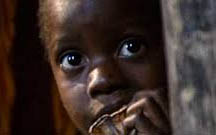 New Delhi, Mar 16: Putting behind them a "raid" on their residences in south Delhi earlier this year, many Africans say the Indian capital is still their "home" and offers them an environment unlike anywhere else in the world.
New Delhi, Mar 16: Putting behind them a "raid" on their residences in south Delhi earlier this year, many Africans say the Indian capital is still their "home" and offers them an environment unlike anywhere else in the world.
"India is indeed a great country. The people here are much better than in other countries, where discrimination against people from African countries is severe," James Okumurah of Johannesburg in South Africa said.
A doctoral scholar at Jawaharlal Nehru University (JNU), Okumurah lives in south Delhi's Khirki Extension, where many other Africans stay. Khirki was where Somnath Bharti, then the law minister in the short-lived Aam Aadmi Party's Delhi government, led a midnight raid, alleging that Africans staying there were involved in drugs and prostitution.
"Certain Africans may be involved (in illegal activities), but doesn't make every African the same," Okumurah asserted.
Peter Masai, who works with a multinational company in Gurgaon, said after the Khirki Extension episode, more than 25 percent of the people opted to to move out of the area and reside in other parts of the city.
Admitting that the episode clearly signified the rise in discrimination against the community, Masai was, however, quick to add that there were quite a few Indians who offered them help and solidarity.
"A controversy like the Khirki Extension was unexpected and shocking, and especially the way the (then) law minister alleged our people of running a drugs and prostitution ring.
But it was nice to see that though a majority of the people in the area wanted us to vacate, there were still many who didn't have any problems in renting us their houses," Masai, who belong to Zimbabwe said.
He added that it all depends on people's "perception" of the community.
Ebre, from Nigeria, said India is comparatively a better country to live in - and he even has plans to settle here. "I am here because the people are good. I am even planning to open a school here and develop my business in the education sector," Ebre who lives at Arjun Nagar, also in south Delhi said.
He also brushed aside suggestions of racial discrimination. "People here cooperate and understand things. Following Bharti's raid, I have not faced any racial discrimination," said Ebre.
Agreed James Uhuru, and said that after the controversy, police have been more attentive to the problems of the African nationals.
"I have seen police personnel suggesting our girls not to be out late in the night, so as to avoid any kind of problems," Uhuru, who belongs to Nairobi, said.
"It is very clear that India will always be a great country, but some people need to change their perception towards the people from Africa," he said. The majority of Africans come here to study, they feel that education is one that drives them to the city.
For many, the city is an area of opportunity that helps them get everything at an affordable rate.
"Be it education or accessing health services, for us it is very cheap here compared to the US or European countries," said Infunanya Onyeke, who is from Kenya.
"Once you are away from home, a few things happen but that doesn't mean we will leave here and go," Onyeke, a student at Delhi University said.





Comments
Add new comment